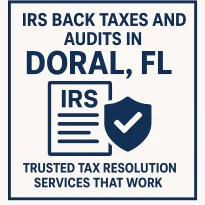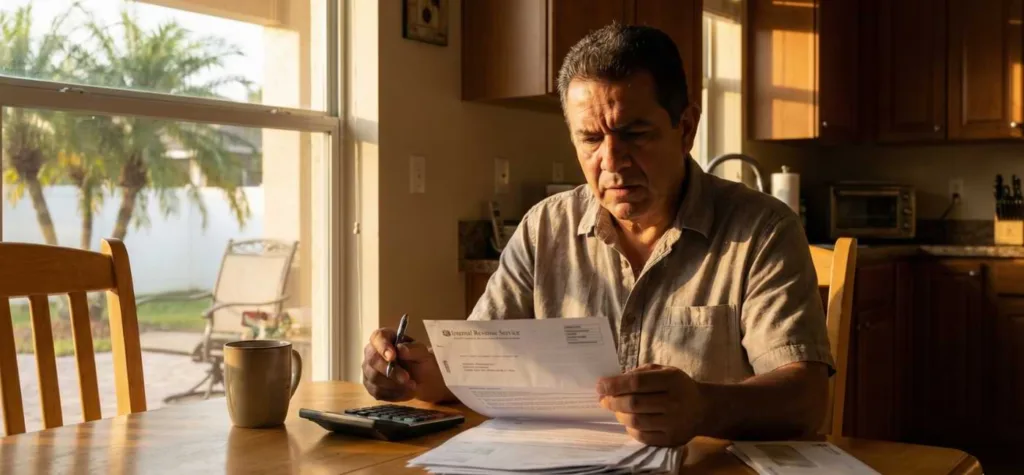Introduction: When the Letter Arrives
Every CPA has war stories, and this one stays close to me because it shows just how devastating—and how survivable—a Florida Department of Revenue (DOR) sales tax audit can be.
It started with a small business in Doral, Florida. The owner had received a Notice of Intent to Audit Books and Records. He wasn’t just nervous—he was terrified. His company had no bookkeeper, his records were incomplete, and the only “system” he had for sales tax filings was a shoebox of crumpled receipts.
This case is a reminder of why Florida DOR Sales Tax Audit Help isn’t just about crunching numbers—it’s about guiding people through a process that feels overwhelming and hostile.
Why Florida DOR Initiates Audits
The Florida Department of Revenue doesn’t pick businesses randomly. They audit when they see risk:
- Late or missing sales tax returns
- Discrepancies between filed returns and bank deposits
- Industry red flags (restaurants, retail, construction—all high-risk in Florida)
- Complaints, whistleblowers, or competitive reports
- Random compliance sweeps
In this client’s case, the DOR saw bank deposits exceeding reported sales. They assumed underreporting. Without intervention, the auditor was prepared to levy penalties and interest that would have sunk the business.
The Audit Process: What Actually Happens
The DOR starts with a letter. My client received the dreaded audit notice, demanding three years of records. But here’s the problem:
- He had no bookkeeper
- He had no organized QuickBooks file
- He had no exemption certificates for non-taxable sales
- He didn’t even have complete bank statements
When the auditor doesn’t see documentation, they don’t wait—they estimate. And when they estimate, the taxpayer almost always loses.
The Challenge: Missing Records and Paper Trails
This business had books in disarray. Here’s what we were up against:
- No QuickBooks file—everything was cash-based and manually tracked
- POS reports missing—the point-of-sale system had crashed months earlier
- Bank records incomplete—he didn’t even have digital access
- Paper bank statements locked in a branch vault
I had to go back to basics. I walked into his bank branch with signed authorizations and physically requested three years of paper statements. I asked the teller to retrieve boxes of records from storage. That’s how raw this audit was—we rebuilt history from paper.
Reconstructing the Records
With those paper statements in hand, we pieced together a story. Here’s how reconstruction works when there’s nothing to start with:
- Bank Statement Analysis
Every deposit was logged, categorized, and matched against reported sales. Credit card merchant deposits were separated from cash. Transfers and loans were isolated so they weren’t mistaken as taxable revenue. - POS Approximation
Since the POS system failed, I used merchant account reports and surviving daily Z-tapes to estimate gross receipts. We built monthly summaries that reconciled with deposits. - Exempt Sales Documentation
Where exemption certificates were missing, we reached out to customers and vendors to recover them retroactively. This step alone saved tens of thousands of dollars in presumed taxable sales. - Vendor Invoices
I collected supplier invoices to prove when sales tax was already paid, preventing double taxation. - Cash Flow Estimates
Using seasonal cash flow trends, we reconstructed cash sales that never made it into the bank.
The work was forensic. It was exhausting. But it turned chaos into a defensible set of books.
How Auditors Estimate Without Records
Had we not reconstructed the records, the auditor would have used shortcuts:
- Industry averages (e.g., assuming every restaurant earns 10% more than reported)
- Purchase-to-sales markup methods
- Sampling one bad month and extrapolating across three years
- Assuming all undocumented sales were taxable
These methods inflate liability. They turn small mistakes into six-figure debts. My role was to replace guesses with evidence.
Representation: Taking Over Communication
I immediately instructed my client not to talk to the auditor. Every statement can be used against you. Instead, I became the single point of contact.
- I negotiated deadlines.
- I challenged improper assumptions.
- I presented reconciled schedules, one document at a time.
- I pushed back when the auditor tried to extrapolate errors across the entire audit period.
By controlling the narrative, I prevented the DOR from railroading my client into unnecessary liability.
The Outcome: Survival, Not Destruction
When the dust settled, here’s what happened:
- The auditor initially wanted to assess triple the tax liability.
- Through reconstruction, I reduced the proposed liability by over 70%.
- I successfully argued for penalty abatement on grounds of poor recordkeeping but no willful negligence.
- Interest still applied, but we negotiated a payment plan that kept the business afloat.
This client went from staring down the barrel of financial ruin to paying a survivable settlement.
Lessons for Business Owners
This case underscores hard truths:
- Poor bookkeeping is expensive. Not having a bookkeeper cost this owner thousands.
- Paper trails matter. Even when digital fails, paper bank statements saved the case.
- Auditors are not your friends. They are trained to find liability, not to help you.
- Reconstruction is possible. Even the worst records can be rebuilt with time and expertise.
- Professional help is essential. DIY defense almost always ends in inflated assessments.
Extended FAQs — Florida DOR Sales Tax Audit Help
1) What triggers a Florida DOR sales tax audit?
Florida’s Department of Revenue selects businesses for sales tax audits based on risk analytics, compliance history, and industry profiling. Common triggers include late or missing sales and use tax returns; material differences between sales reported to the state versus sales implied by bank deposits, merchant statements, or federal returns; and refund claims that appear outsized relative to historical filings. Industry characteristics matter as well: restaurants, retail, construction contractors, and rental businesses often draw heightened scrutiny because they either handle large volumes of cash, have complex exemption issues, or sell across jurisdictions. Whistleblower tips or competitor complaints can also initiate a review. In addition, routine compliance sweeps target clusters of similar businesses in defined geographic areas like Doral, enabling auditors to compare peers and spot outliers quickly. A seemingly minor red flag—such as consistently underreporting compared with local medians—can be enough to prompt contact. For an official overview of the state’s goals and process, see the DOR’s audit guidance below.
2) How many years does the Florida DOR look back in a sales tax audit?
As a general guideline, Florida sales tax audits examine approximately three years of activity, aligning with the routine period covered by many state audits. However, this is not a hard cap. If the Department identifies substantial underreporting or non‑filing, the review period can extend further—especially for months in which no return was filed at all. Auditors typically begin with the standard three‑year scope, request records to evaluate completeness, and then determine whether sampling, extrapolation, or scope expansion is warranted. Strong, well‑organized documentation can help contain the audit to the initial period and reduce the risk of projection. For primary law on sales and use tax administration and DOR rules, consult the links below.
3) What if I don’t have records during a Florida DOR sales tax audit?
When adequate records are unavailable, Florida auditors may estimate taxable sales using indirect methods—bank deposit analysis, purchase‑to‑sales markups, and sample‑period extrapolation. These methods can dramatically inflate liability because they presume taxability unless proven otherwise and may ignore refunds, exempt transactions, or timing differences. The absence of documentation shifts the burden to the taxpayer. The countermeasure is rapid reconstruction: retrieve bank statements (including paper copies from your branch), export what you can from the POS, obtain merchant processor summaries, and collect vendor invoices. Rebuild monthly schedules of taxable and exempt sales, tie them to deposits, and document exceptions. While time‑consuming, this converts a punitive estimate into a defensible narrative supported by third‑party evidence. The brochures below outline how Florida’s DOR approaches audits and sampling when records are incomplete.
4) How does a CPA reconstruct missing or disorganized records?
A disciplined reconstruction follows a forensic workflow designed to replace assumptions with evidence. First, secure bank statements for every month in scope and catalog all deposits, separating operating receipts from loans, owner contributions, inter‑account transfers, and refunds. Next, obtain merchant processor reports (including annual 1099‑K totals and monthly batch details) to anchor card sales. Where possible, export POS Z‑tapes or monthly sales summaries and align them with merchant deposits, adjusting for processing delays and chargebacks. For cash activity, triangulate using daily sales logs, supplier cash purchases, and cash deposits to infer realistic levels of cash sales. Simultaneously, rebuild exemption support—locate resale or exemption certificates and match them to invoices—and review vendor invoices to avoid double tax on purchases. The deliverable is a set of reconciliations tying bank deposits to reported sales and clearly documenting taxable versus exempt revenue. Florida’s official resources on audits and sales tax basics are linked below.
5) What rights do I have during a Florida DOR audit?
Taxpayers have the right to clear notice of the audit’s scope, reasonable time to gather records, and representation throughout—meaning you may designate a CPA to communicate with auditors and attend conferences on your behalf. You are entitled to understand why information is requested, to request scheduling adjustments when reasonable, and to present documentation before a proposed assessment is finalized. If you disagree with preliminary findings, you may pursue an informal conference to clarify methodology, sampling, and adjustments. After a proposed assessment issues, you have defined windows to protest and present additional evidence; formal appeal routes exist if disputes remain. Florida publishes a Taxpayer’s Bill of Rights and provides information on Informal Dispute Resolution (IDR). Knowing these resources—and asserting them professionally through your representative—translates legal rights into practical leverage.
6) What are the most common mistakes business owners make during an audit?
Three missteps cause the most damage. First, unrepresented conversations with auditors: well‑meaning owners “explain” discrepancies without documentation, inadvertently admitting to errors or offering timelines that conflict with records; those statements become part of the file and are hard to unwind. Second, disorganized submissions: partial bank statements, missing POS details, and unlabeled spreadsheets suggest negligence and invite aggressive estimation and penalties. Third, neglecting exemption documentation: failing to collect and retain resale or exemption certificates forces auditors to treat otherwise exempt sales as taxable. Other pitfalls include commingling personal and business activity, backdating edits in accounting software, or providing data exports that don’t reconcile to returns. To understand Florida’s expectations and avoid surprises, review the DOR’s audit overview and sampling guidance.
7) Can penalties and interest be reduced in a Florida DOR sales tax audit?
Interest is statutory and accrues from original due dates, so it is rarely waivable. Penalties, however, are often negotiable if you can demonstrate reasonable cause and cooperation. Audits commonly propose penalties for negligence, late filing, or substantial underpayment. To seek relief, present a fact pattern showing that errors stemmed from inexperience, reliance on unqualified bookkeeping, system failures, or other non‑willful factors, and document corrective actions—such as hiring a qualified bookkeeper, implementing POS controls, and adopting monthly reconciliations. Strong reconstruction that materially reduces proposed tax also supports penalty mitigation by proving your effort to remediate. For payer obligations and relief context, see the official references below.
8) How long does a Florida DOR sales tax audit take?
Timelines depend on scope, complexity, and record quality. Straightforward desk audits with organized records can conclude in 8–12 weeks, while field audits involving reconstruction often run six to nine months or more. Several phases influence duration: initial notice and records request; entrance conference and scoping; data acquisition and testing (including sampling decisions); preliminary findings; and conference or protest. Delays frequently arise from incomplete records, POS export issues, or the need to retrieve historical bank statements and exemption certificates. While longer audits create stress, time can be strategically helpful: it lets your team complete reconciliations, secure missing documentation, and negotiate more accurate methods. Florida’s official materials describing audit stages and e‑audits are linked below.
9) Should I handle a Florida DOR audit myself?
Self‑representation is risky because sales tax audits hinge on technical definitions of taxability, documentation standards for exemptions, and statistically valid sampling. Auditors are trained to probe for inconsistencies and will memorialize your statements; casual comments intended to be helpful can lock you into positions that are difficult to defend. Without experience, it’s easy to provide incomplete data, accept unfavorable sampling frames, or fail to segregate non‑taxable revenue correctly. A CPA experienced in Florida audits does more than “talk” to the auditor—they rebuild your records, ensure deposit‑to‑return ties, challenge flawed methodologies, and present alternatives grounded in evidence. For expectations and your rights during the process, consult the official resources below.
10) What should I do immediately after receiving a Florida DOR audit notice?
Act quickly and methodically. First, do not call the auditor—designate a CPA to represent you and route all communications through them. Second, secure core records: full bank statements for each month in scope, merchant processor summaries (including annual 1099‑K and monthly batch reports), POS exports (daily Z‑tapes or monthly summaries), filed sales tax returns and workpapers, and exemption/resale certificates. Third, freeze ad‑hoc edits in your accounting system; instead, reconstruct via external schedules tied to third‑party statements. Fourth, prepare a master reconciliation that ties deposits to reported sales by month, clearly segmenting taxable versus exempt revenue and noting timing differences. Finally, align on a response plan: request reasonable extensions as needed, schedule an entrance conference, and decide whether sampling or full‑detail testing is most favorable given your data. For official orientation on the audit process and dispute options, review the links below.



